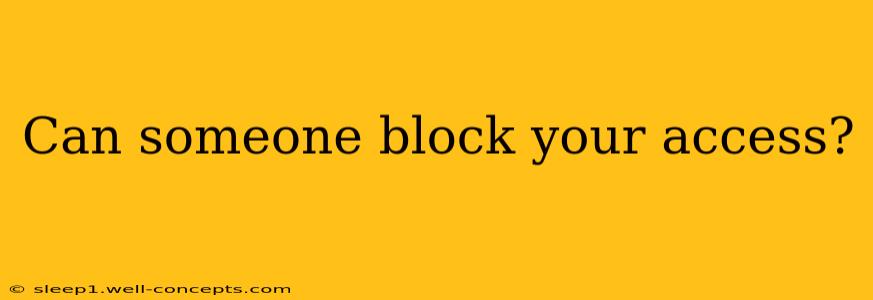Can Someone Block Your Access? Understanding Access Control and Its Implications
The simple answer is: yes, someone can block your access to various things, both online and offline. The specifics depend heavily on what access is being blocked and who is doing the blocking. Let's explore the different contexts where access control plays a crucial role.
Online Access Control: The Digital Landscape
The internet is built on access control. Every website, app, and online service uses various methods to determine who can access what. This is done for security, privacy, and to manage resources effectively. Here are some key ways your online access can be blocked:
-
Website Administrators: Website owners have complete control over who can access their site. They might block access based on IP address (banning specific users or entire networks), user accounts (deactivating or suspending access), or even geographic location (geo-blocking).
-
Network Administrators: If you're on a network like a school, workplace, or public Wi-Fi, the network administrator can control what websites and services you can access. This often involves firewalls and content filtering systems. They might block access to certain sites deemed inappropriate or disruptive.
-
Service Providers: Platforms like social media sites, online gaming services, and streaming platforms all have their own terms of service and user agreements. Violating these terms can lead to account suspension or permanent bans.
-
IP Address Blocking: Your internet service provider (ISP) or a website might block your IP address if it's associated with malicious activity, such as spamming or hacking attempts.
-
Account Takeovers: If someone gains unauthorized access to your accounts, they can change passwords, block your access, or even delete your account entirely. This highlights the importance of strong passwords and multi-factor authentication.
Offline Access Control: Physical and Real-World Limitations
Access control isn't limited to the digital realm. In the physical world, various mechanisms exist to restrict access:
-
Physical Locks and Keys: Doors, gates, and other physical barriers are the most common examples of offline access control. These rely on physical keys, keypads, or biometric scanners.
-
Security Personnel: Guards and security staff often control access to buildings, events, or restricted areas. They enforce rules and regulations, preventing unauthorized entry.
-
Access Cards and Badges: These are often used in workplaces and other secure locations, granting access to specific areas or systems based on individual permissions.
Protecting Your Access: Proactive Measures
Understanding how your access can be blocked is the first step towards protecting it. Here are some proactive measures you can take:
-
Strong Passwords: Use unique, strong passwords for all your online accounts. Consider a password manager to help you manage them effectively.
-
Multi-Factor Authentication (MFA): Enable MFA whenever possible to add an extra layer of security to your accounts.
-
Regular Security Updates: Keep your software and operating systems updated to patch security vulnerabilities.
-
Be Aware of Phishing Scams: Avoid clicking on suspicious links or attachments, as these can lead to malware infections or account compromises.
-
VPN Usage: Using a VPN can mask your IP address, providing an added layer of protection against IP address blocking in certain situations.
In conclusion, the ability to block access is a fundamental aspect of both online and offline security. Understanding the different ways access can be restricted and taking proactive steps to protect yourself is essential in today's interconnected world. Always be vigilant and practice safe online and offline habits to safeguard your access.

